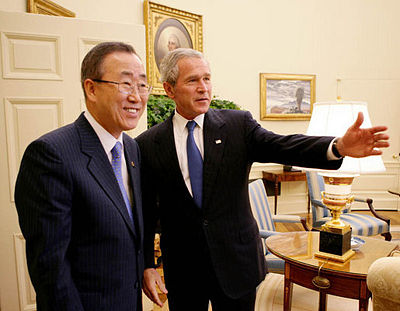Ban, Bush to discuss ceasefire resolution Tuesday
 New York - UN Secretary General Ban Ki-moon said Monday he plans to discuss with US President George W Bush the draft resolution hammered out by Arab governments calling for a ceasefire in the Israel-Hamas conflict.
New York - UN Secretary General Ban Ki-moon said Monday he plans to discuss with US President George W Bush the draft resolution hammered out by Arab governments calling for a ceasefire in the Israel-Hamas conflict.
Ban is to have lunch with Bush at the White House, providing a unique opportunity to discuss the war in Gaza Strip, fresh from his discussions with Arab foreign ministers at UN headquarters.
Ban again called for a ceasefire to be durable, implemented immediately and fully respected by both Israel and Hamas. Ban said discussions with Arabs led to a "convergence of major elements" in the ceasefire draft resolution, which he called on the UN Security Council to enact decisively sometime this week.
"We have agreed on a credible mechanism to ensure the humanitarian conditions and prevent further conflict," Ban told reporters following a closed-door meeting with Arab ministers. He said the agreed elements will provide the "groundwork" for the 15-nation council when it takes up the ceasefire draft resolution for discussion.
Ban was to meet the Arab ministers on Wednesday after his luncheon with Bush.
Arab countries attending the meetings in New York included Morocco, Syria, Lebanon, Egypt, Libya, Jordan, Qatar, United Arab Emirates and Saudi Arabia. Officials from the League of Arab States attended.
Palestinian Authority President Mahmoud Abbas and Saudi Foreign Minister Prince Saudi al-Faisal were to arrive in New York on Tuesday.
Elements apparently agreed upon by all include an immediate ceasefire fully respected by all sides, a monitoring mechanism for carrying out the ceasefire, re-opening of border crossings into Gaza and a plan to resume peace negotiations to end the conflict.
The US also supported reopening of border crossings.
Earlier, Arab League's Secretary General Amr Moussa said his group wanted a ceasefire resolution that would be "balanced" and aimed at protecting the population in Gaza Strip against Israeli ground attacks.
Moussa told reporters that the draft resolution seeks to protect the besieged Gazans traumatized by nine days of Israel-Hamas fighting, and would be submitted to the UN Security Council on Tuesday.
"The Americans and many delegations have talked about a balanced resolution," Moussa told reporters. "Now it is our turn to insist on a balanced resolution, and we insist on that. It cannot address an Arab party without seriously and decisively addressing Israel, the occupying power, with a lot of obligations, and also about what's happening to the civilian population."
Asked whether he expects the US to veto the resolution, Moussa said, "I hope the Americans will not block the resolution. I am not here for a veto of the resolution. We are here for a resolution to help redress the situation in Gaza and assist the civilians that are under constant attacks by Israel."
Ban told the Arab ministers that he supports an "immediate ceasefire that is durable and fully respected by all."
"We must insist that Israel end its military assault, which is clearly excessive," Ban said. "We must insist that Hamas end immediately the rocket attacks that are so terribly counterproductive in addition to being completely unacceptable."
The UN Security Council, under the presidency of France in January, had scheduled a meeting on Tuesday to discuss other issues and it was possible the ceasefire proposal could be discussed.
Washington opposed an earlier proposal that singled out and condemned only Israel in the war.
Palestinian Authority Foreign Minister Riyad al-Malki said the Arab ministers were working through a "proper channels" to convince Washington to support the new text.
The UN said the humanitarian situation in Gaza has "dramatically deteriorated" since Israel launched the military campaign on the ground on Saturday. John Holmes, the chief of UN humanitarian operations, said Gazans are faced with worsened living conditions and inadequate health services. The UN staff assisting Gazans have reached the state of exhaustion amidst the fighting.
In Washington, the US said it was pushing for a ceasefire that would require Hamas to halt rocket attacks into Israel but would also open crossings into the isolated enclave, US State Department spokesman Sean McCormack said.
Secretary of State Condoleezza Rice spoke to more than a dozen counterparts over the weekend seeking support for the proposal, which would also address tunnels used by Hamas to smuggle weapons from Egypt, McCormack said.
Asked whether Hamas would support the new text proposed by Arab governments, Al-Malki said: "We are really working in order to get a resolution that will be implementable. What's important here is we are looking for the interests of the Palestinian people."
Al-Malki said the Palestinian Authority was "disappointed" that US President-elect Barack Obama, who takes office January 20, has so far failed to voice a position on the Israel-Hamas fighting.
"We expect him (Obama) to take a strong position as soon as possible," al-Malki said.
Obama's team has adopted a mantra that there is only one US president at a time.
"It is particularly important to adhere to the principle of one president at a time, because there are delicate negotiations taking place right now, and we can't have two voices coming out of the United States," Obama said in Washington.
Bush Monday repeated his past support of Israel's right to defend itself. (dpa)